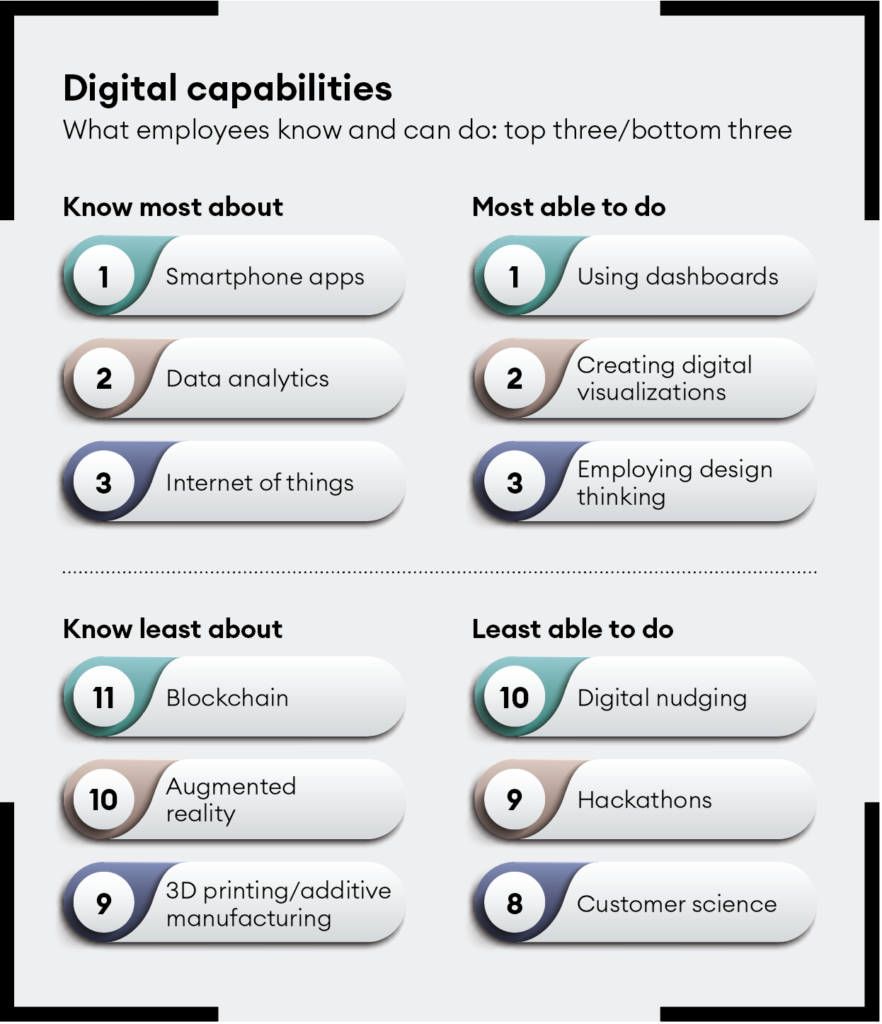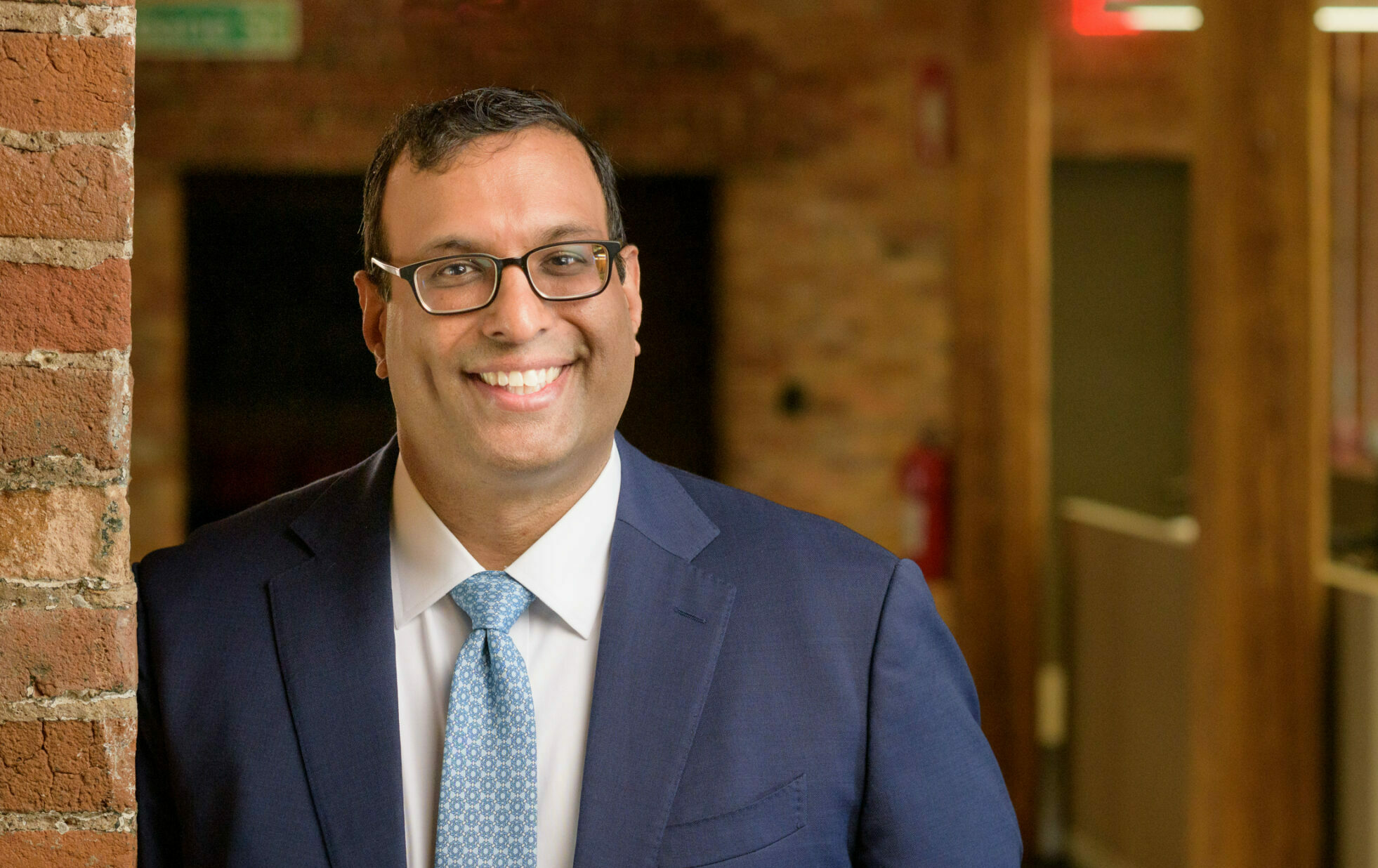Individuals have the knowledge but not the skills to participate in digital transformation. Closing this gap is critical.
Digital transformation is a long and challenging journey – and one that ends in failure two-thirds of the time, according to our research. There are multiple organizational-level reasons for that failure rate. But another reason, that is sometimes overlooked, is that employees have not sufficiently embedded digital skills into their day-to-day transformation activities.
Our latest survey, as presented in the Digital Maturity Index Report 2022, reveals that 71% of individuals who responded are at the lowest level of digital maturity. Only 5% of respondents scored at the highest level. This means that employees at all levels are struggling to move from acquiring new digital knowledge to embedding it into practice. They have more knowledge than skills to participate in digital transformation. We call this difference the digital knowing-doing gap.
Closing this gap is critical for organizations, most of whom are still in the early stages of becoming digitally driven. New capabilities are required, and this demand differs from previous transformations. Most of us have not been taught how to write code, build an AI algorithm, or leverage an ecosystem. There has been a rush to upskill employees, but the rollout has been uneven. Through our client work across industries, we have researched and observed significant disparity in digital readiness at all levels, including senior leadership.
The lack of visibility around any one individual’s digital maturity has proven frustrating because there is no reliable baseline from which organizations can make targeted improvements. This frustration became the catalyst for us to create the Digital Maturity Index (DMI), which assesses an individual’s position along their digital journey (not within their organization). The DMI measures both what people know and do, and then scores an individual’s results at one of three stages.
1. Reacting
The most basic level of digital maturity where an individual may still be learning the vocabulary, technologies and methodologies pertinent to digital transformation.
2. Embedding
The intermediate level where individuals typically possess the ability to put knowledge and methods to work each day.
3. Strategizing
The most advanced level where individuals can fluently speak the vocabulary and apply the knowledge or method, but also look ahead to capture opportunities or create strategic value.
Understanding the gap
What, then, were the results of our 2022 research? The data reveals that people know the most about smartphone apps, data analytics and the internet of things (IoT), while knowing the least about blockchain, augmented reality, and 3D printing/additive manufacturing.
The fact that smartphone apps emerged first is no surprise given their everyday use. Apps are familiar and well along the adoption curve. Similarly, analyzing data and leveraging IoT are also becoming more common. Meanwhile, blockchain, to a great extent, remains a solution in search of a problem and currently has relatively niche applications, such as cryptocurrency.
On the doing front, respondents reported being most capable of using dashboards, creating data visualizations, and employing design thinking. However, they were least familiar with digital nudging – that is, behavioral science in a digital setting – hackathons, and customer science.
Although people were challenged to use data and make good decisions, their ability to use dashboards is encouraging. But, consistent with our knowing results, the doing scores reveal that the most-familiar methodologies scored the highest.
Accelerating critical methodologies
Organizations can unlock the full value of their digital knowledge investments by accelerating the use of critical methodologies. Capabilities that scored only in the middle of our rankings, such as customer journey mapping, experimenting, hackathons, leveraging the ecosystem, and adopting agile at scale, are key to unlocking the value of employee knowledge. Prioritizing these capabilities and putting them into practice is how you close the digital knowing-doing gap.
Employees (including leaders) can transform faster and more effectively when engaged in an activity rather than sitting in a classroom. DBS Bank – one of the top ten digital transformations of the last decade – accelerated learning in the early stages of its digital journey by using hackathons. The bank wanted employees at every level to recognize the opportunity of becoming digitally-driven. While DBS still offers more than 10,000 courses to support upskilling, the immersive and active learning of a hackathon was game-changing.
So how can any organization close the gap more quickly? Here is a four-step process.
- Create a digital maturity baseline by assessing people in entire business units or departments.
- Provide aggregated data to the workforce so they can consider how their digital maturity compares to their peers and the business strategy.
- Offer employees the opportunity to learn and apply (i.e. to know and do) digital technologies and methodologies.
- Develop individual digital learning journeys that have support from supervisors.
A similar four-step process works for individuals. Understanding your own personal digital maturity is the essential first step. Reflect on why the results may be as they are, identify specific steps to take next, and then act every day in a series of small steps (rather than making major changes in a few large steps). Many tiny steps will get you to the same destination without placing an unmanageable burden on your time.
The discovery of a digital knowing-doing gap serves as an early warning to organizations and their leaders. It’s time to dramatically increase our focus on digital activities – to focus on what people are doing – to unlock the full value of our digital knowledge and deliver value to customers.
Robin Speculand is chief executive of Bridges Business Consultancy Int and a Duke CE adjunct faculty member. Professor Michael Netzley is founder of Extend My Runway, an AI-for-good start-up. They are joint authors of the Digital Maturity Index Report 2022: Closing the Digital Knowing-Doing Gap.




